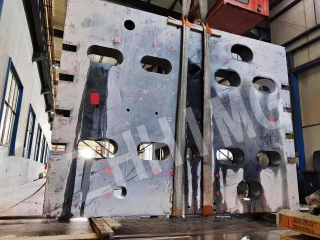Granite is a popular material for precision components due to its unique properties and advantages over other materials such as steel or aluminum. Several key factors come into play when comparing precision granite parts to those made of steel or aluminum.
First, granite is known for its exceptional stability and resistance to temperature fluctuations, making it ideal for precision components that require high precision and reliability. Unlike steel and aluminum, granite expands and contracts minimally, ensuring consistent performance under varying environmental conditions. This stability is critical for applications where dimensional accuracy is critical, such as metrology, semiconductor manufacturing and precision machinery.
In addition, granite has excellent damping properties, effectively reducing vibration and reducing the risk of deformation or wear over time. This is especially advantageous for precision equipment, where smooth and precise movement is critical for optimal performance. In comparison, steel and aluminum are more prone to vibration and resonance, which can affect component accuracy and longevity.
In addition, granite has an excellent natural flatness and surface finish, making it ideal for precision applications that require tight tolerances and smooth contact surfaces. This inherent flatness reduces the need for extensive machining and finishing processes, ultimately saving time and cost in part production. Steel and aluminum, while machinable, may require additional steps to achieve comparable flatness and surface quality.
When it comes to durability and longevity, granite outperforms steel and aluminum in many situations. Its high resistance to wear, corrosion and chemical damage ensures a longer service life and minimal maintenance requirements, making it a cost-effective choice for precision components in demanding industrial environments.
In summary, precision granite components offer clear advantages over steel and aluminum, particularly in terms of stability, damping, flatness and durability. These properties make granite an excellent choice for applications where precision, reliability and long-term performance are key considerations. As technology continues to advance, granite’s unique properties may further solidify its position as the material of choice for precision engineering.
Post time: May-28-2024

